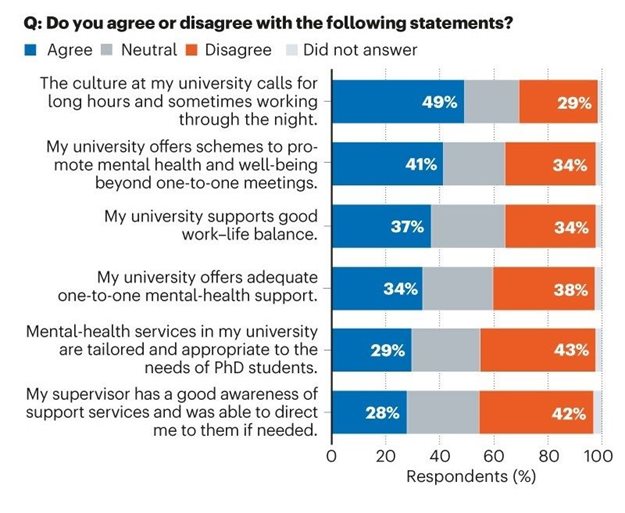
Stress is a word almost synonymous with doing a PhD. Scientific endeavour always pushes one to move forward, which can be an excellent motivator for curious minds. Sadly, the state of constant running also takes a toll on people. 36% of graduate students reported that they have sought help for PhD-related anxiety and depression in a large multicultural survey done by the journal Nature in 2019. This serious mental health risk needs to urgently attract the attention of institutions and group leaders.
The Netherlands is not doing better
From my conversations with friends doing their PhDs in various countries, I know that we actually have relatively good conditions as PhD candidates here in the Netherlands. However, studies about mental health lay out a different picture. PhD council of the University of Amsterdam conducted a survey in 2015 and found out that 36.5% of the PhD candidates are at risk for clinical depression. This risk was 41% for women. A 2016 study by Leiden University supported these findings and found 38.3% of PhD candidates at serious mental health risk. Many reported frequent loss of sleep and concentration problems, which could seriously affect their work performance.
Why are we not talking about this?
With all these studies ringing the alarm bells, I am very frustrated that we are not talking about this enough. Whether or not PhD-related, having mental health problems is still a secret whispered in coffee room corners to that one colleague who seems non-judgemental. Sometimes not even that. Some just quietly suffer until they collapse with burnout. I've been dealing with my fair share of anxiety disorder and depression for years. My research career is not the source of these problems, but it can certainly be a trigger at times. On top of that, my mental health struggles frequently affect my performance, making me feel guilty and even more anxious. You see, it turns into a vicious cycle. Unless we talk about it and work together to manage it.
You are not alone!
Why should we be open about our mental health? Firstly, to tell the quiet sufferers they are not alone. I often feel like I'm the only one having problems while everyone seems to be doing just fine. This can't be the reality, though. Just look at the statistics! Being affirmed that we are not alone would take so much pressure off our shoulders. Nothing is more frustrating than not being able to tell your colleagues or supervisor about your suffering simply because you don't want them to see you as incompetent. Especially if there's no guarantee that the response would be empathetic.
Dear group leaders, you should help us start this conversation
I believe that the people with the most power to change this status-quo are the group leaders. They are usually unaware of the problems junior researchers are facing. Undoubtedly, managing a team while simultaneously teaching, doing administrative tasks, and hunting for grants is challenging. However, this is a crisis worth directing time and attention to. My belief is that we need frequent conversations about mental health. Asking about it once a year as a formality for the annual performance appraisal is definitely not enough.
It would be great to have regular group discussions about the work atmosphere and the difficulties people experience. The supervisors might lead the way by being open and sharing some of their own past and current challenges. It would signal that our struggles are not to be ashamed of and that the people we idealize struggle too. In one-to-one meetings, supervisors should be clear about their expectations from each person to prevent anxiety stemming from uncertainty and perceived pressure to be fast. Of course, some tasks might really be urgent. We have been doing work at lightning speed in my department during the COVID-19 pandemic. However, it's important to be flexible about what to expect from each person at a certain time, depending on their particular situation.
I believe that if group leaders get more open and encouraging to discuss these issues, junior colleagues would also naturally start to communicate and create a more comfortable and compassionate environment among themselves.
Institutions are not helping enough
Although communication with colleagues and leaders is critical, institutions are certainly not off the hook. I'm lucky enough to have an amazing daily supervisor with whom I can share my problems and who always has my back. Unfortunately, not everyone is that lucky. If the immediate work environment is not able or willing to help, one needs other doors to knock on. Nature's survey did not just reveal the mental health risks of graduate students but also the inability of institutions to take care of them. Out of those who sought help, only 26% were able to get assistance at their institution. Another 18% have tried it but wasn't supported. The figure below from the survey illustrates the sad facts better than I can put into words.

Image Source: Nature PhD Survey 2019
How can Radboudumc help?
Radboudumc has just published a new website called "A vibrant workplace". On this site, you can find information on who you can turn to other than your colleagues and supervisors, the supporting activities and events such as the peer coaching groups, and some helpful course offerings including mindfulness-based stress reduction. Even though there is still much to be done, this is a good step to guide the people seeking support.
To anyone struggling: Please know that you are not alone, and you can speak up. Seek help. Use the resources that Radboudumc offers and demand more if you think they are not enough. To group leaders and all other colleagues: Please try to start a conversation and don't shy away from leading the way. A comfortable, safe and healthy work environment would make everyone more productive, creative, and collaborative.
